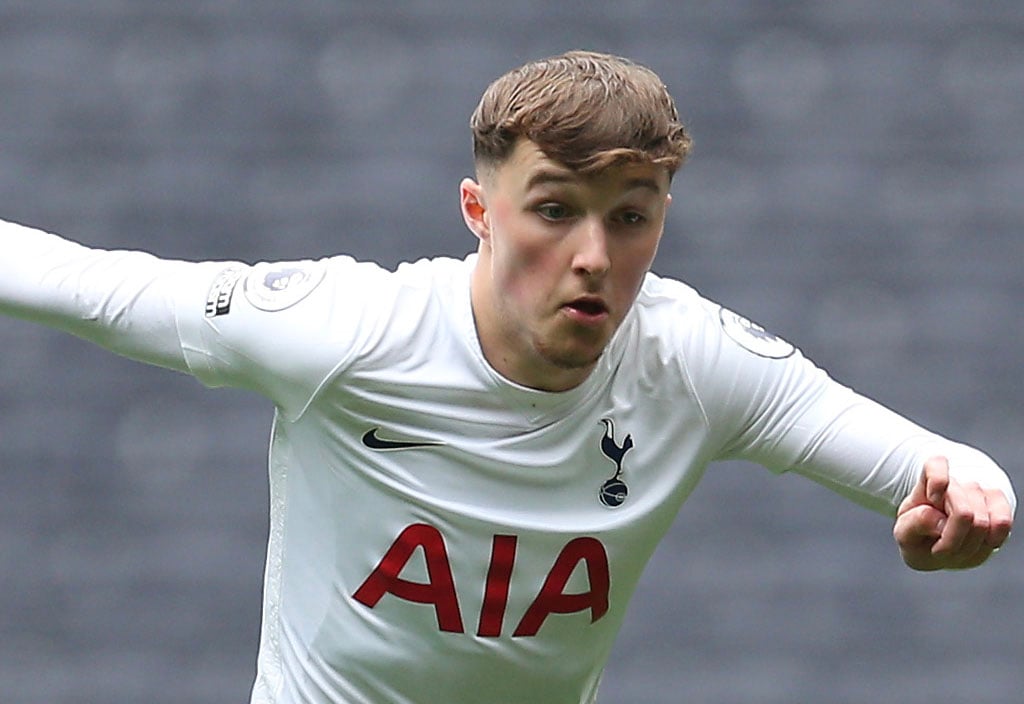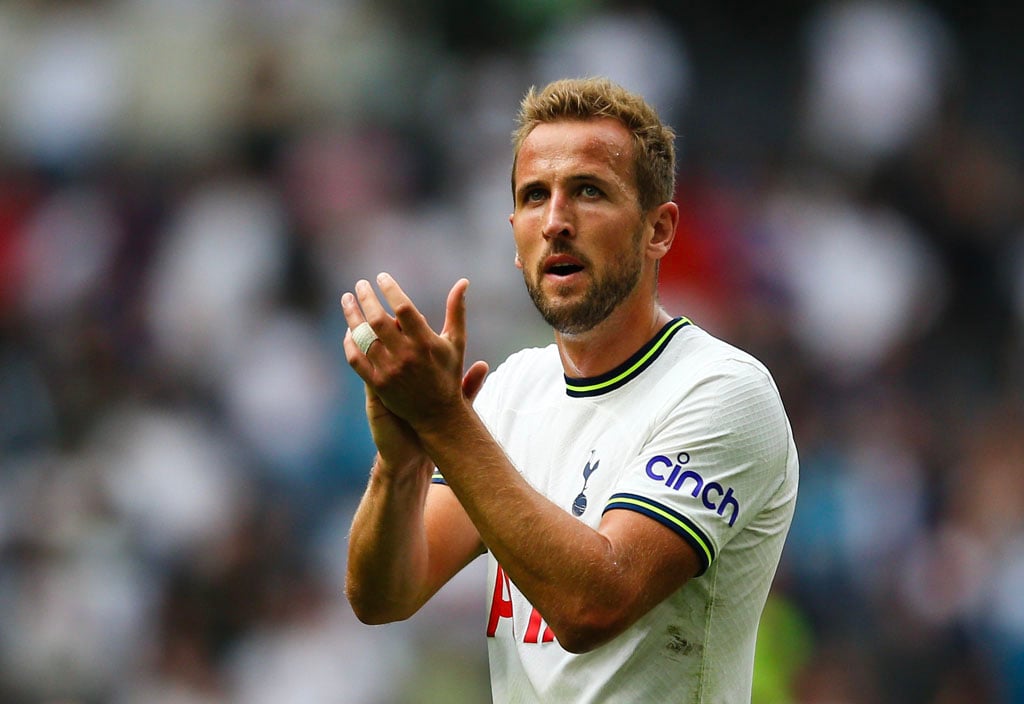Earlier in the year, I made a case for Cuti Romero to be named captain. Admittedly, it was more a thought-provoking piece rather than a genuine call to arms.
The choice was clear, obvious and only needed to be announced. Son would be captain and that would be that.
Yet there is a reason that Ange Postecoglou is the Tottenham manager and I am just a bloke sitting behind a laptop (despite leading Vauxhall Motors to multiple Champions League on Football Manager 2013).
When Son was duly announced as captain, it was part of a leadership triumvirate. This is a relatively new concept and not something that has been commonly seen in football despite people being anointed vice-captain or being part of a ‘players’ representative group’.
In this system, Son would be the new sheriff in town, ably by his deputies, Messrs Maddison and Romero. In theory, it made sense (despite some chuckles from opposition fans), but time has proved that it has been a masterstroke from Postecoglou.

LONDON, ENGLAND – OCTOBER 23: Son Heung-Min of Tottenham Hotspur celebrates their first goal during the Premier League match between Tottenham Hotspur and Fulham FC at Tottenham Hotspur Stadium on October 23, 2023 in London, United Kingdom. (Photo by Charlotte Wilson/Offside/Offside via Getty Images)
By having three leaders, Anger realised, you can combine a range of characteristics to create one ‘super captain’ and also give all players a ‘link’ to a leader, be that be by position, age or nationality.
However, for such a combination to work effectively, the constituent parts have to work both individually and as a collective. So let’s look at what each brings to the role.
In all honesty, the South Korean was the obvious choice for the role of captain. He is the elder statesman of the starting eleven, and a player whose open devotion to a club is rare in this day and age.
In the depths of the darkness under Nuno, while Harry Kane was trying to wangle a move to Manchester City, Son came out and signed a new contract. To do so at such a time spoke volumes – he is Mr Tottenham.
However, his appointment challenges the traditional view, bandied about by a collaboration of pundits and former pros – that there are two types of captain.
Either you fall into the category of badge-thumping, loud shouting, heart-on-the-sleeve leader, or there is the lead-by-example player – an individual that lets his feet to the talking and inspires others thus.
Although Son does lead by example, that is not what makes him the leader he is. In all honesty, he is a modern man. Yes, he usually does perform, but when he is not, he is openly vulnerable and takes and accepts criticism.
Previously, I thought this would be a reason to not give him the captaincy – as it might be extra responsibility that he did not need. I was wrong and am a victim of my antiquated thinking.
Imagine the culture in that dressing room now. If you make a mistake, or are suffering with form, you have a captain, who will be there for you and seems as though he will emotionally connect with people – rather than just offering the same tired platitudes about ‘you’ll turn it around’ or ‘better luck next time’.
This is not to criticise others, it is to shine a light on the fact that, in a world of alpha males and hyper-competitiveness, you have a man who is capable of bucking the trend and succeeding.
Some may, lazily in my opinion, attribute this to his ‘culture’ or ‘heritage’. This does Sonny a disservice; the truth of the matter is that he is just a beautiful human being – I hate the phrase ‘one of the good guys in football’ but here it is apt.
From the moment he walked through the door, Son has been a bundle of positive energy. From his elaborate collection of handshakes with the likes of Dele and Kyle Walker, to his warm welcome of new, younger players such as Pape Mate Sarr.
Son’s personality also seems to dovetail nicely with that of Postecoglou. Some like to lean into the narrative that ‘Big Ange’ is a warm and avuncular character, however, he has made it clear – in various interviews – that he is somewhat detached from the players.
They love him, that is true, but that is because he is direct and unequivocal in his communication and his expectations and is not driven by his own self-ego. It does not sound like much – but doesn’t everyone wish their respective bosses behaved in such a fashion? Anyway, I digress.
In true Sonny fashion, he is more than happy to be part of a ‘leadership team’. Many would see it as a slight, or would feel that their ego was somewhat bruised at having to ‘share’. Sonny however has embraced the idea of a ‘team’ and made both Maddison and Romero feel just as important.
The fact that he was never part of the previous ‘leadership committee’ seems bizarre and wondering why may take one into more uncomfortable avenues of thought.
At the time, the selection of Maddison as vice-captain would have to be regarded as a calculated risk. Now, a quarter of a season in and playing like he has been at The Lane for years, it seems an obvious choice, but at the time it seemed like even more pressure on his shoulders.
However, pressure, it seems, is something that Maddison thrives upon. This is where he demonstrates his true leadership.
When Spurs are in the proverbial ‘pickle’, he has the desire, combined the technical excellence, to be that talismanic figure and drive the team on. He wants to be ‘The Man’. It reminds me, to some extent, of Gareth Bale. When the chips were down and all hope was lost, he would come to life.
Do not be surprised to see multiple Maddison-inspired last-minute reprieves in the coming seasons.
He is also symbolic of the new era at Spurs and represents hope, change and excitement at what might come to pass. A player not tarnished by previous disappointments or associated with past regimes.
He has that intangible trait of being charming and has already developed a strong relationship with both the squad and the fan base.
At the team’s nadir last season, I had never felt so detached from the club I love. It is incredible that having orators such as Ange and Maddison, who are so excited to be at the club can serve to reforge links that many thought might take years to repair.
Cristian Romero is turning into a Tottenham leader
So why is Romero a good choice? When I wrote my aforementioned article, I did not truly believe it myself (Spurs Web) but the arguments were logical at the very least.
In his role, he has stepped up as the main man in defence. He is their leader and acts as such. His plethora of fouls and yellow cards he acquired at will have all but evaporated.
For now, such claims about his commitment to the club seem to have dissipated. I am showing my age here, but he is still a boy – but boys quickly grow up when responsibility is laid on their shoulders.
There is a final angle that needs to be observed when looking at the leadership group as a whole – there is the bigger picture. Few places are more cosmopolitan in places of work than a Premier League dressing room.
In the current first-team Tottenham squad, there are players from sixteen different countries and three different continents (The Premier League).
Despite the myriad nations represented, the previous leadership group had a distinctly Western European feel to it. Kane, Dier, Hojbjerg and club captain Hugo Lloris compromised the group and purportedly the next inductee was to be Oliver Skipp.
Consider all the players in that dressing room who previously may not have felt represented by this selection. This is not a dig at those players, but an observation around diversity and inclusivity – we are constantly given the message ‘See it to be it’.
This limited selection could only serve to lead to a fragmented dressing room and the building up of cliques and factions. Now, the squad seems, like the peak Pochettino days, to be a united and integrated family.
Like almost every article relating to Tottenham at the moment, there needs to be a nod to the greater challenges and adversities that will undoubtedly lie ahead. However, you get the impression that the current guidance and togetherness will hold them in good stead.
Have something to tell us about this article?



